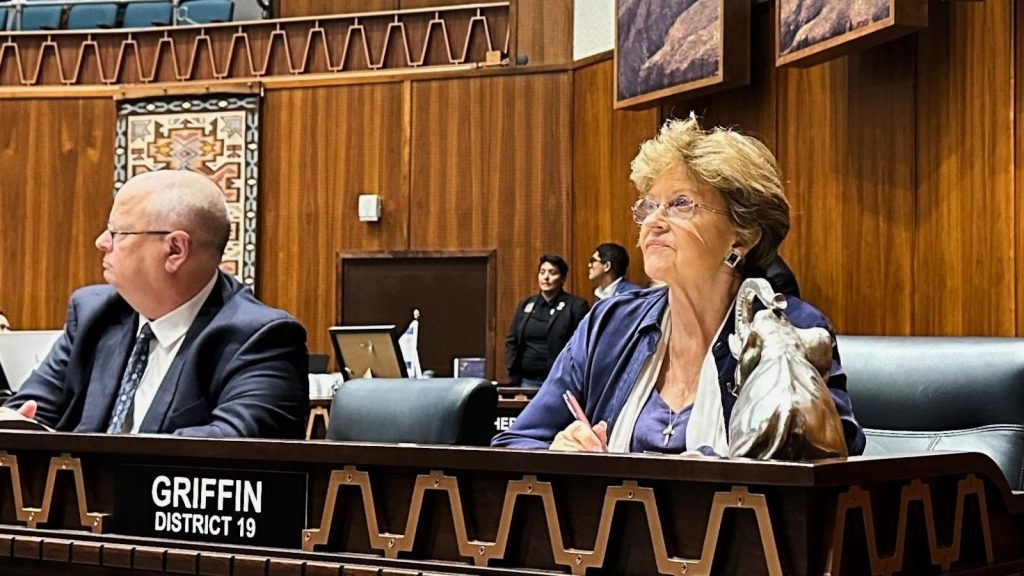PHOENIX — Throughout two decades marked by drought, climate change and growing demand for water, Arizona’s leaders have fiercely debated an increasingly urgent problem: how to manage dwindling water supplies in an arid state.
At the crossroads sits Rep. Gail Griffin, a savvy and quietly assertive lawmaker who has for years used her status as the leader of key water and land use committees in the Republican-controlled Legislature to protect property owners’ rights, deciding which bills live and die.
Griffin’s iron fist has infuriated residents and other lawmakers worried that unfettered groundwater pumping is causing wells to run dry. She’s also drawn the ire of Democratic Gov. Katie Hobbs, who considered her the barrier to legislation that stalled this year despite having others at the negotiating table.
Without the Legislature charting a path, Hobbs could tap her executive authority to carve out specific areas where regulations could be imposed, like she did in recent months with the Willcox Basin north of Douglas.
At the start of this year’s session, Hobbs floated a proposal to regulate pumping in rural areas but the bipartisan deal failed to get Griffin’s support.
Griffin, however, did back a separate measure to let farmers transfer their pumping rights to developers, who can then access credits to demonstrate they have enough drinking water to supply future housing projects. It was one of the most significant pieces of water legislation to win approval this year.
Still, domestic well-owner Karen Weilacher and other residents are frustrated that efforts to expand Arizona’s 1980 groundwater code have repeatedly failed despite pleas to address unchecked pumping as conditions worsen — in the state and greater Southwest region.
Arizona’s code already allows for managing pumping in major metropolitan areas. The disagreement is over a framework for rural areas. Lawmakers also have clashed over who would govern the use of the water and pathways for future regulation.
Weilacher, earlier this year, addressed the natural resources committee led by Griffin. She pivoted to let the powerful panel read her shirt: “Water is life.”
“I shall use the remainder of my time to do what Representative Griffin has done to us,” she told committee members, as she turned her back on them.
Griffin declined to comment specifically on her role in shaping Arizona’s water policy, but she’s adamant about her belief that Hobbs’ proposal would devastate agriculture and rural economies.
“As we work with stakeholders, we will continue to support private property rights and individual liberty while ensuring that any legislative solution protects local communities and our natural resource industries, allowing rural Arizona to grow,” Griffin said in an emailed response to an interview request from The Associated Press.
With a legislative tenure dating back to 1997, Griffin’s convictions are anchored in preserving a rural lifestyle in which residents help each other and reject government mandates, said former House Speaker Rusty Bowers, a friend of hers for decades.
“She was a hard-core believer in her principles,” Bowers said. “And if you didn’t respect it, then get the heck out of the way, she’ll run over you like a Mack truck.”
Back home in Hereford, Griffin has been known to go on walks, armed with her gun and mobile phone. A member of the Arizona Farm Bureau and the Arizona Cattle Growers Association, she has referred to her ranching neighbors as “true environmentalists” because they take care of the land year-round.
At a 2019 forum, Griffin recounted an exchange in which she was advised how to handle a bear busting into her home, questioning at the time whether calling authorities for help would be enough to keep her safe.
“And what will you do when I shoot and kill that bear?” Griffin had asked. She didn’t like the answer she got — that prosecution, jail time and a fine would be likely.
Griffin won the crowd over with her rural sensibilities.
She told them the desire to give people the tools they need to protect themselves and their property is what first led her to run for public office. That hasn’t changed.
Her stances resonate with voters who repeatedly send her back to the statehouse.
Cochise County farmer Ed Curry is one of them but wouldn’t say whether he would do so next year as Griffin eyes a seat in the state Senate. He said he and other constituents have begged Griffin to usher in change, sharing stories at a town hall last year about wells drying up and the exorbitant costs residents face when digging deeper wells.
“She doesn’t ask, she tells. She doesn’t listen, she speaks,” Curry said of Griffin.
Curry, who serves on the governor’s water policy council, said that even growing crops that don’t require much water hasn’t kept his wells from dropping. He said new regulations will help to ensure Arizona’s future.
“Something has to be done,” he said.
___
The Associated Press’ women in the workforce and state government coverage receives financial support from Pivotal Ventures. AP is solely responsible for all content. Find AP’s standards for working with philanthropies, a list of supporters and funded coverage areas at AP.org.



